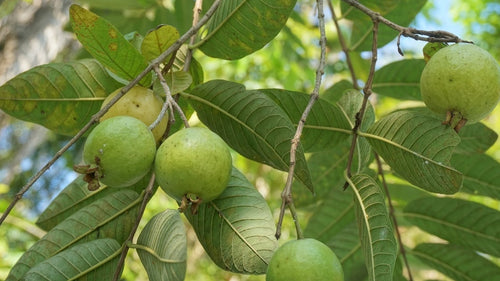Azbil’s Agroforestry Action: Empowering Agroforests for a Sustainable Future
Azbil India Private Limited has undertaken a tree plantation initiative in Pune, as part of its commitment to sustainability and environmental respons Read more
Project Update 3
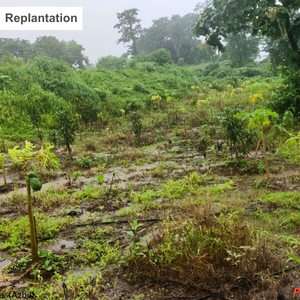
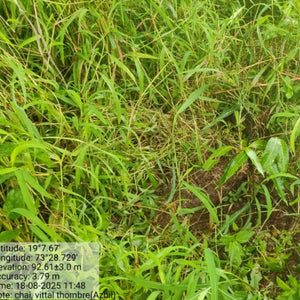
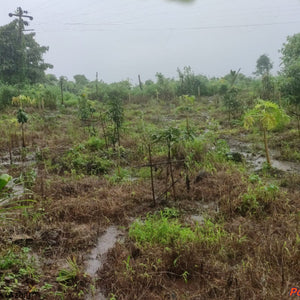
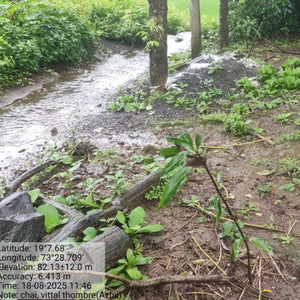
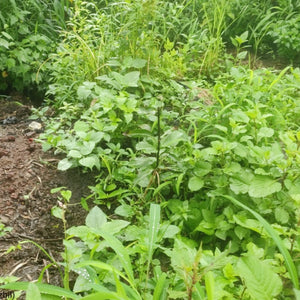
Project Update 2
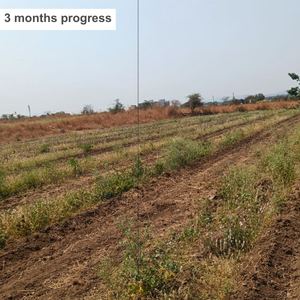
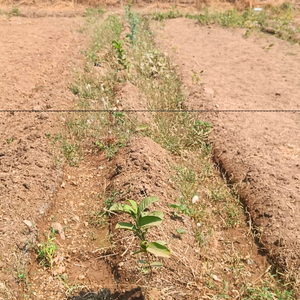
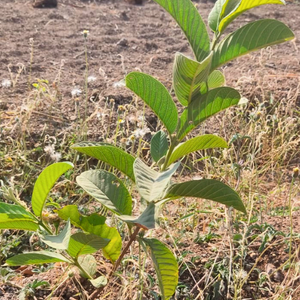
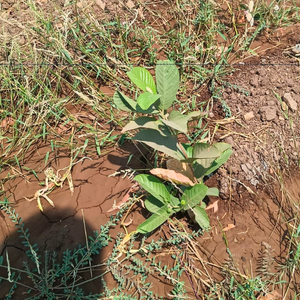
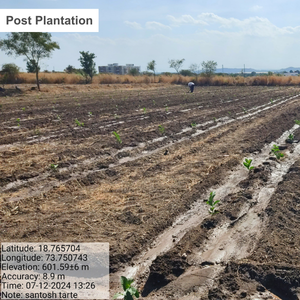
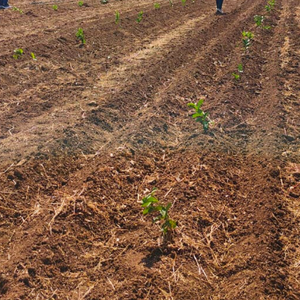
Project Update 1
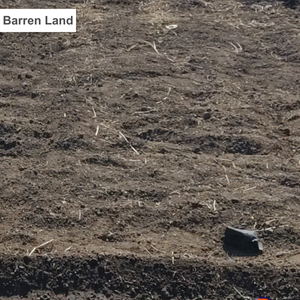
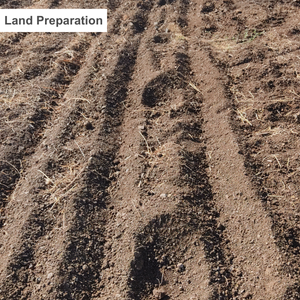
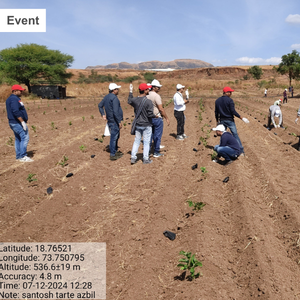
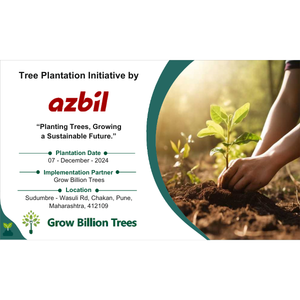

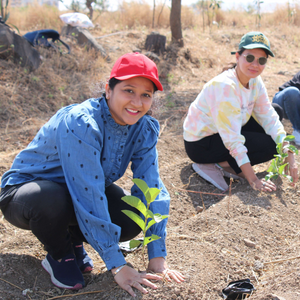
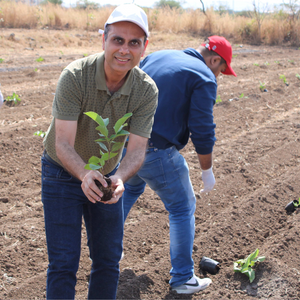
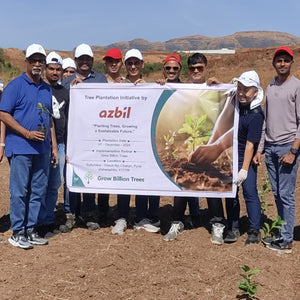
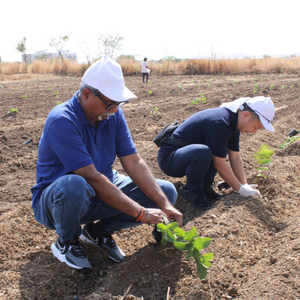
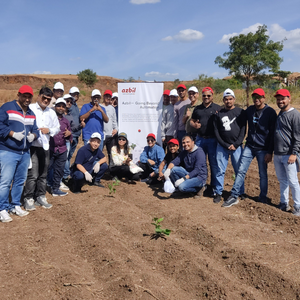
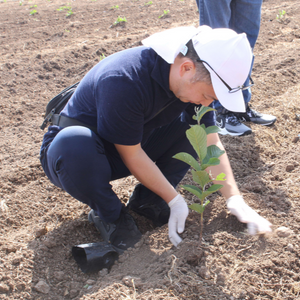
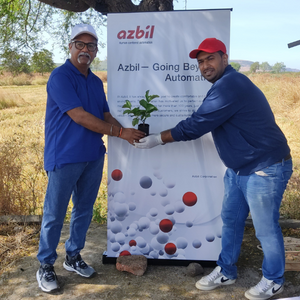
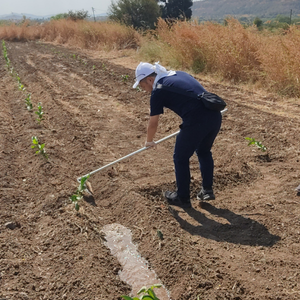
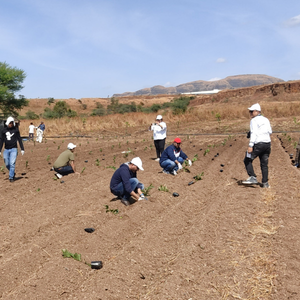
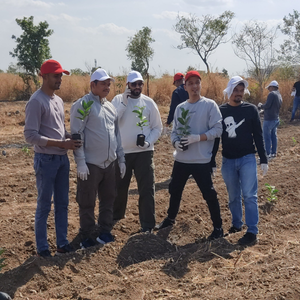
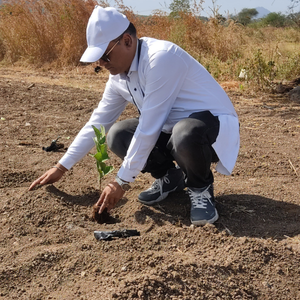
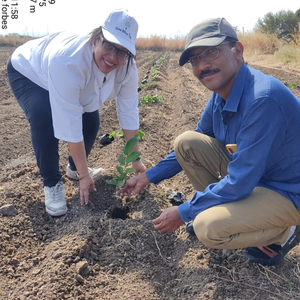
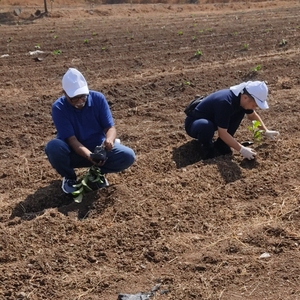
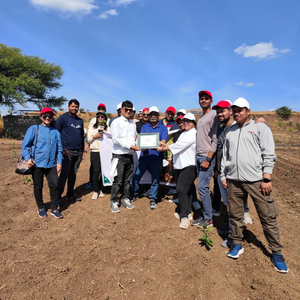
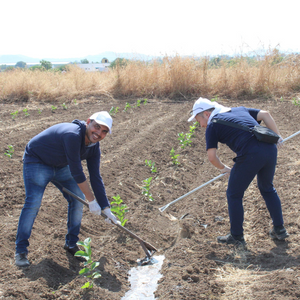
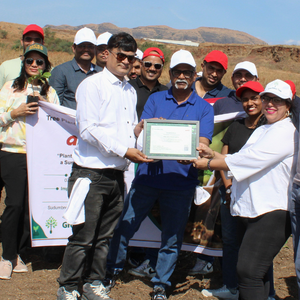
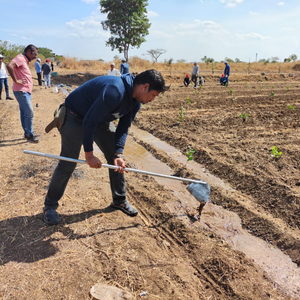
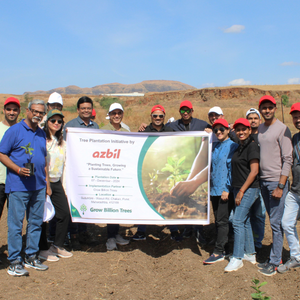

Digital Forest
Forest with 200 Trees planned
Want to plant your tree now?
Plant a Tree @ 299Trees Planted
Azbil’s Agroforestry Action: Empowering Agroforests for a Sustainable Future
Azbil India Private Limited has undertaken a tree plantation initiative in Pune, as part of its commitment to sustainability and environmental responsibility. On 7th December 2024, a total of 200 Guava trees were planted to promote agroforestry practices. This initiative integrates tree planting with sustainable farming to enhance biodiversity, improve soil fertility, and support local farmers.
Agroforestry is a sustainable land management practice that integrates trees with agricultural activities, creating a balanced ecosystem that benefits both the local communities and the environment. This not only improves land productivity but also strengthens farmers' livelihoods by diversifying their revenue streams, reducing dependency on single crops, and ensuring long-term financial stability. Additionally, agroforestry contributes to long-term climate resilience by reducing soil erosion, enhancing carbon sequestration, and promoting sustainable resource use. By combining forestry with farming, agroforests enhance soil fertility, conserve water, and support biodiversity while providing food through fruit-bearing trees.
The collaboration with Grow Billion Trees significantly enhanced the project's effectiveness by utilising their expertise in sustainable forestry for seamless execution. Skilled farmers undertook the plantation activities, ensuring proper care and long-term growth of the trees. Moreover, the initiative also served as a valuable platform for employee participation, fostering environmental consciousness and reinforcing the company’s commitment to corporate social responsibility.
Azbil’s tree plantation initiative reflects its deep-rooted commitment to sustainability, seamlessly integrating environmental responsibility into its corporate values. By fostering ecological restoration and supporting farmers with sustainable livelihood opportunities, this initiative not only enhances green cover but also strengthens rural communities, ensuring a lasting positive impact on both nature and society.
Project Planning & Execution
No of Trees: 200
Plantation Location: Chai, Karjat, Maharashtra 410101
Plantation Date: 7th December 2024
Name of Species: Guava
Species Selection & Its Benefits:
The project emphasizes planting native tree species, ensuring high survival rates and long-term ecological health while aligning with local market demand to provide farmers with viable income opportunities. Farmer consent is integral to the selection process, ensuring species complement existing agricultural practices. The project strategically selected Guava (Psidium guajava) trees for plantation due to their multiple ecological, economic, and social benefits. Hardy and low-maintenance, Guava provides a reliable income through its fruit while enriching soil fertility, reducing erosion, and creating a favorable microclimate for crops. This thoughtful selection supports both environmental sustainability and the economic stability of local communities. Additionally, the trees contribute to carbon sequestration, enhancing climate resilience while strengthening the region’s green cover. Their ability to thrive with minimal water input makes them well-suited for sustainable farming in the area.
Planting Methodology and Its Advantages
Agroforestry: Azbil’s agroforestry initiative follows a strategic planting methodology that integrates trees, crops, and livestock on the same land, providing farmers with additional income and improving livelihoods. By combining agriculture and forestry, it enhances soil fertility, conserves water, and increases biodiversity while offering multiple revenue streams through timber, fruits, fodder, and medicinal plants. This method reduces climate risks, improves farm productivity, and ensures long-term economic stability for farmers, making it a viable solution for sustainable rural development.
As part of its Corporate Social Responsibility (CSR) initiatives, Azbil embraces agroforestry as a key strategy for carbon sequestration, ecosystem restoration, and sustainable land management. This initiative underscores the company’s commitment to environmental stewardship, demonstrating a proactive approach to sustainability that contributes to a greener, more resilient future for generations to come. By adopting this integrated approach, Azbil not only enhances environmental sustainability but also strengthens local communities by promoting long-term economic stability for farmers, ensuring a balanced coexistence of agriculture and forestry.
Advantages of Agroforestry
-
Increased Farmer Incomes: This approach helps in increasing the farmer’s income by as much as 3 times. Farmers benefit from diversified income sources, lifting economic resilience.
-
Sustainable Livelihoods: Farmers benefit from diversified income sources through the sale of fruits and other tree-based products, reducing dependence on a single crop.
-
Enhanced Biodiversity: Agroforestry creates a diverse ecosystem by integrating trees with crops, attracting pollinators, birds, and beneficial insects that support natural pest control.
-
Environmental Sustainability: This model reduces carbon emissions and promotes sustainable land management, aligning with SDG 13 (Climate Action) and SDG 15 (Life on Land).
-
Food Security & Nutritional Benefits: Fruit-bearing trees provide a direct source of food, improving local nutrition while supporting long-term agricultural productivity.
-
Carbon Sequestration & Climate Resilience: Trees absorb carbon dioxide, helping mitigate climate change while providing shade and windbreaks that reduce temperature extremes and improve microclimatic conditions.
- Soil Health and Water Conservation: Tree roots prevent soil erosion, enhance water retention, and improve soil fertility by fixing nitrogen and adding organic matter. Agroforestry systems also support groundwater recharge, reduce runoff, and improve soil moisture retention, making them ideal for drought-prone regions.
Activities During Tree Plantation
During Azbil’s tree plantation initiative carried out under the agroforestry concept as part of its CSR activities, all plantation tasks were carefully executed by the skilled farmer. The initiative was thoughtfully designed to align with environmental conservation goals and create a lasting positive impact. The plantation drive saw active participation from Mr. Shailendra Sharma, Managing Director, Azbil India Pvt. Ltd., and his team, along with Ms. Monika Nagrare, an employee from Grow Billion Trees.
Before the plantation, the site was carefully prepared, ensuring optimal soil conditions, designated planting zones, and well-maintained saplings selected for their ecological and economic benefits. On plantation day, employees and volunteers worked together under the expert guidance of Mr. Santosh Tarte (farmer) to plant each sapling at the correct depth and spacing, ensuring healthy growth and long-term sustainability.
Following the plantation, the saplings were watered, and protective measures were put in place to support their survival. This agroforestry initiative not only contributes to soil enrichment, water conservation, and biodiversity restoration but also strengthens farmers' livelihoods by diversifying income sources and promoting sustainable farming practices.
Conclusion Elements
Impact
Direct Impact
|
Parameters |
Values |
References |
|
No. of Trees Planted |
200 |
|
|
Green Cover (Acres) |
0.15 |
|
|
Fruit Production Potential (Tons/Year) |
6 |
|
|
Income Generation Potential (Rs/Year) |
120,000 |
|
|
Carbon Sequestration Potential (KG) |
20 |
Small to medium-sized trees can sequester around 10–48 kilograms (22–106 pounds) of CO₂ annually. https://onetreeplanted.org/blogs/stories/how-much-co2-does-tree-absorb |
|
Carbon Sequestration by 200 mature trees ( Tons/year) |
4 Tons |
No. of Trees x Carbon Sequestration by 1 mature tree per year |
|
Carbon Credit Equivalent |
4 |
One carbon credit is equivalent to one tonne of carbon dioxide or the equivalent amount of another greenhouse gas. |
|
Carbon Footprint of an avg Indian Citizen (Tons/Year) |
1.8 |
|
|
Offsets Annual Carbon Footprint of (Adults) |
2 |
Carbon offset by 200 mature trees per year / Carbon Footprint of an avg Indian Citizen per year. |
* This impact analysis is forward-looking (An Agro-forestry project matures in 3-5 years)
Indirect Impact
Community Impact
-
Empowerment of Farmers - By providing training and resources for sustainable farming practices, agroforestry equips farmers with skills to enhance productivity and adapt to environmental changes.
-
Food Security – By integrating fruit-bearing trees into agricultural systems, the initiative ensures a stable food supply, providing nutritious produce for both consumption and market sale.
-
Environmental Awareness – The project educates the local community on the importance of tree planting, biodiversity conservation, and sustainable land use.
-
Enhanced Social Equity- Agroforestry initiatives foster enhanced social equity by empowering marginalized farmers with sustainable livelihoods, bridging economic gaps, and promoting inclusive community participation in environmental conservation efforts.
-
Resilience to Climate Change – Agroforestry improves soil health, enhances water retention, and reduces land degradation, making farming communities more adaptable to changing climate conditions.
- Health and Well-being – Increased green cover improves air quality, reduces heat stress, and provides access to nutrient-rich fruits, contributing to the overall health of local communities.
Environmental Impact
-
Carbon Sequestration – The trees absorb atmospheric carbon dioxide, contributing to climate change mitigation and reducing greenhouse gas emissions.
-
Soil Health Improvement – Tree roots help prevent soil erosion, enhance organic matter content, and improve soil fertility, promoting sustainable agriculture.
-
Biodiversity Enhancement – The plantation increases green cover and provides habitat for local wildlife, supporting a thriving ecosystem.
-
Water Conservation – Tree canopies reduce water evaporation, while roots enhance groundwater recharge, improving long-term water availability.
-
Microclimate Regulation – Increased vegetation helps moderate temperatures, reduce heat stress, and create a favourable environment for agriculture and human settlements.
- Air Quality Improvement – The trees act as natural air filters, absorbing pollutants and increasing oxygen levels, contributing to a healthier environment.
Achievements
SDG Goals Achieved through Agroforestry
SDG 1: No Poverty – By diversifying income streams for farmers through agroforestry, Azbil’s initiative helps alleviate poverty and improves the economic resilience of rural households.
SDG 2: Zero Hunger – The integration of fruit-bearing trees like Guava ensures food security by improving soil fertility and providing sustainable agricultural yields.
SDG 3: Good Health and Well-Being – Trees enhance air quality, create green spaces for mental well-being, and support a healthier environment for local communities.
SDG 4: Quality Education – Azbil’s agroforestry initiative includes training and awareness programmes that educate communities on sustainable land-use practices. These programs empower individuals with conservation knowledge, environmental stewardship, and resource management.
SDG 6: Clean Water and Sanitation – Azbil’s tree plantation project enhances water conservation by improving soil moisture retention, reducing runoff, and supporting sustainable water management practices in the region.
SDG 8: Decent Work and Economic Growth – Azbil’s initiative generates employment opportunities, provides training in sustainable practices, and supports long-term economic growth in the region.
SDG 9: Industry, Innovation, and Infrastructure – Azbil’s plantation integrates innovative agroforestry practices, enhancing sustainable land use and fostering industry-community collaboration. Through resilient agricultural systems, geo-fencing, and technical support, it promotes environmental sustainability and economic development.
SDG 10: Reduced Inequalities – By engaging marginalised and small-scale farmers, the initiative reduces economic disparities and promotes inclusivity in rural communities.
SDG 12: Responsible Consumption and Production – Agroforestry emphasizes sustainable farming techniques, reducing reliance on chemical inputs and promoting eco-friendly agricultural practices.
SDG 13: Climate Action – Azbil’s plantation acts as a carbon sink, mitigating climate change impacts, enhancing ecosystem resilience, and promoting sustainable land use.
SDG 15: Life on Land – Azbil’s initiative restores biodiversity, prevents soil erosion, and promotes sustainable agroforestry, directly contributing to protecting, restoring, and enhancing terrestrial ecosystems.
SDG 17: Partnerships for the Goals – The collaboration between Azbil India Private Limited, Grow Billion Trees, and local communities highlights the power of partnerships in achieving sustainable development goals and fostering collective action for environmental restoration and social impact.
ESG Achieved through Agroforestry:
-
Environmental Impact: Azbil’s agroforestry initiative significantly contributes to environmental sustainability by enhancing carbon sequestration, restoring biodiversity, and improving soil and water conservation. The plantation of native and fruit-bearing trees supports climate change mitigation by reducing greenhouse gas emissions and promoting ecosystem resilience. Additionally, the project helps prevent soil erosion, enhances groundwater retention, and fosters a greener landscape, ensuring long-term ecological benefits.
-
Social Impact: The initiative positively impacts local communities by creating sustainable livelihood opportunities for farmers, diversifying income sources, and improving food security. Agroforestry practices promote better land use efficiency, leading to increased agricultural productivity and economic stability for rural households. The plantation also enhances air quality, provides green spaces for community well-being, and engages local stakeholders through awareness, empowering them with knowledge of sustainable practices.
- Governance Impact: Azbil upholds strong governance principles through its commitment to ethical and responsible corporate practices in sustainability. The agroforestry initiative aligns with the company’s broader CSR strategy, ensuring transparency, accountability, and long-term impact. By collaborating with Grow Billion Trees and local communities, Azbil fosters strategic partnerships that reinforce environmental stewardship and responsible land management. This initiative reflects Azbil’s dedication to integrating ESG principles into its corporate framework, demonstrating leadership in sustainability and social responsibility.
Building Communities
Azbil’s agroforestry initiative goes beyond tree plantation—it strengthens rural communities by empowering farmers, fostering collaborations, and creating sustainable livelihoods. By integrating environmental stewardship with social impact, the project nurtures a sense of shared responsibility, driving long-term benefits for both people and the planet.
-
Empowering Farmer: Azbil’s agroforestry initiative strengthens farmers’ economic stability by diversifying income sources and improving agricultural productivity. By integrating tree plantations with existing farmland, farmers benefit from enhanced soil fertility, better crop yields, and long-term financial gains. This initiative promotes self-sufficiency and long-term environmental stewardship, ensuring a sustainable future for both farmers and the ecosystem.
-
Fostering Partnerships: Collaboration is at the core of Azbil’s plantation initiative, bringing together corporate, environmental, and community stakeholders. The partnership between Azbil India Private Limited, Grow Billion Trees, and local farmers created a strong foundation for sustainable development. By leveraging collective expertise and resources, this initiative ensures that environmental and social benefits extend beyond the immediate plantation, fostering long-term ecological and economic resilience.
-
Creating a Ripple Effect: The impact of this initiative goes beyond tree planting; it sets in motion a chain reaction of positive environmental and social change. By improving biodiversity, enhancing carbon sequestration, and promoting sustainable farming, the project contributes to a healthier ecosystem. Additionally, as more farmers adopt agroforestry practices, the region experiences long-term economic and environmental benefits, inspiring further community-driven conservation efforts.
This initiative proved that environmental sustainability thrives when rooted in community effort. It’s not just about planting trees—it’s about planting hope, collaboration, and a shared vision for a greener tomorrow.
Commitment by Grow Billion Trees
-
Ensuring Tree Survivability: GBT prioritizes native species, continuous monitoring, and soil health improvement using organic fertilizers. These efforts ensure sustainable growth and benefit the farmers and communities.
-
Transparency & Accountability: GBT provides detailed reports on tree growth, survival rates, and carbon benefits, using geo-fencing and regular updates to maintain transparency and effectiveness.
-
Sustainable Plantation Efforts: GBT implements projects that balance environmental, social, and economic goals, addressing urban heat islands and degraded farmlands. These efforts promote ecological balance, livelihoods, and long-term climate resilience.
-
Enhancing Ecosystem Health: By selecting native species and creating diverse habitats, GBT enhances biodiversity and ecosystem resilience, ensuring long-term ecological health and supporting wildlife.
Long-Term Impact: GBT’s initiatives tackle environmental challenges, enhance rural livelihoods, foster climate resilience, and promote sustainable development while reducing carbon footprints.
Acknowledgment
We extend our heartfelt gratitude for the successful completion of the plantation initiative at Karjat, Maharashtra. This achievement marks a significant step towards environmental restoration, sustainable land use, and community empowerment, and would not have been possible without the collective efforts of committed individuals and organizations.
To Azbil India Private Limited: We sincerely thank Azbil for its unwavering dedication to sustainability and environmental conservation. By integrating agroforestry into its Corporate Social Responsibility (CSR) efforts, Azbil has demonstrated a strong commitment to fostering greener landscapes and supporting local communities. We deeply appreciate Azbil’s initiative in planting 200 Guava trees, which will not only enhance biodiversity and soil health but also contribute to carbon sequestration. Moreover, this effort plays a vital role in supporting farmers by providing them with an additional source of income through fruit production. Azbil’s dedication to sustainable land use and community upliftment is truly commendable, and we are grateful for its contribution to a greener future.
To the Farmers of Karjat: Your dedication to embracing agroforestry and incorporating fruit-bearing trees into your farming practices is truly commendable. This initiative not only enriches soil health but also strengthens long-term agricultural sustainability. Your commitment to fostering a healthier ecosystem while securing a better future for future generations is inspiring. We are grateful to be part of this journey and look forward to witnessing the lasting positive impact of your efforts.
To the Local Community: The dedication and enthusiasm of the local community have been instrumental in the success of this initiative. Your active involvement in embracing sustainability has turned this vision into reality. The positive impact seen today reflects your hard work and commitment to building a greener, more sustainable future. We sincerely appreciate your support and engagement in making this plantation drive with Azbil a meaningful step toward environmental and community well-being.
To Our Partners and Volunteers: Your dedication, expertise, and passion for environmental conservation have been essential in making this initiative a success. Through our collective efforts, we have shown that collaboration and a shared vision for sustainability can create a lasting impact. Your invaluable contributions have played a crucial role in driving this mission forward, and we deeply appreciate your commitment. Thank you for being an integral part of this journey toward a greener future.
Through this collective effort, we have taken significant steps toward revitalizing ecosystems, promoting sustainable agriculture, and enhancing the livelihoods of farmers in Karjat. This is just the beginning, and we look forward to strengthening our partnership in pursuit of a greener, more sustainable future for all.
Thank you for your unwavering commitment and support
Closing Remarks
The successful completion of the agroforestry plantation at Karjat, Maharashtra marks a significant milestone in Azbil’s journey toward environmental sustainability and community empowerment. This initiative has not only expanded the region’s green cover but has also provided long-term benefits to local farmers by integrating sustainable agricultural practices. By enhancing soil fertility, supporting water conservation, and creating an additional source of income through fruit production, the project strengthens livelihoods and promotes financial stability for farming communities.
With 200 trees now flourishing, this initiative will continue to contribute to ecological balance, biodiversity restoration, and climate resilience. As we celebrate this achievement, we reaffirm our commitment to driving impactful sustainability efforts and inspiring more organisations and individuals to take action for the environment.
We extend our deepest gratitude to Azbil, the farmers of Karjat, our partners, and all those who contributed to making this project a success. Your dedication and collaboration have been instrumental in turning this vision into reality.
This is just the beginning of a larger movement towards a greener and more sustainable future. Through collective efforts, we can build a resilient environment and leave a lasting legacy for generations to come.
Trees for Corporates
Trending
Most Popular
1. Agroforestry and Sustainability
Agroforestry is the perfect blend of agriculture and forestry, and it’s about more than just planting trees—it's about creating ecosystems that thrive. Azbil’s involvement in agroforestry helps increase biodiversity, improve soil quality, and sequester carbon. It’s like hitting three birds with one stone! This approach not only boosts agricultural productivity but also provides a sustainable solution to land management. By embracing agroforestry, Azbil proves that environmental sustainability can go hand-in-hand with business objectives. It’s about creating a greener future while optimizing resources, and who doesn’t want to be a part of that? Think of it as eco-friendly multitasking, where trees do more than just stand around—they get to work for the planet!
2. Employee Engagement in Environmental Initiatives
What happens when you combine a passionate workforce with environmental action? You get Azbil’s employee engagement in tree plantation initiatives! Azbil takes employee participation to the next level by involving them in meaningful, hands-on activities like planting saplings in agroforests. This isn’t your typical “sit-and-listen” corporate event. It’s about creating a culture of environmental stewardship where employees feel proud to contribute to a greener future. Azbil’s approach proves that when employees are part of the solution, their sense of purpose and connection to the company grows—literally! It’s engagement that goes beyond the office, bringing employees together for a cause that benefits both them and the planet.
3. Tree Plantation for Biodiversity
Azbil boosts biodiversity while also tackling pressing environmental challenges. So, next time you see a tree being planted by Azbil’s employees, remember, it’s more than just green—it’s the future of a diverse and flourishing ecosystem.
4. Agroforest Carbon Sequestration
nature's carbon-sucking superheroes. Azbil’s tree plantation initiative in the agroforest concept is all about leveraging these carbon-fighting champions to reduce the company’s carbon footprint. By planting trees within an integrated farming system, Azbil contributes to the battle against climate change by absorbing carbon dioxide from the atmosphere. Trees in agroforests don’t just grow—they work, helping to mitigate the environmental impact of industrial activity. This initiative showcases how businesses can do their part in climate action, proving that going green isn’t just a trendy move; it’s an essential one for future sustainability.
5. Sustainable Land Use Practices
Azbil’s agroforest tree plantation initiative promotes sustainable land use practices that are both efficient and environmentally friendly. By combining tree planting with agriculture, Azbil enhances land productivity while minimizing negative environmental impacts like soil erosion and over-farming. Agroforestry ensures that land is used to its fullest potential, without exhausting it. This is not your typical “use it and lose it” approach. Instead, it’s a strategy that keeps the land healthy and productive for generations to come. In a world where land is precious, Azbil proves that smart, sustainable management is the way forward.
6. Corporate Social Responsibility (CSR) through Agroforestry
When it comes to corporate social responsibility (CSR), Azbil doesn’t just stop at writing checks or organizing charity events. The company gets its hands dirty (literally) by actively engaging in environmental conservation through agroforestry. This initiative aligns with CSR goals by making a positive impact on both the environment and the local community. The hands-on tree plantation program isn’t just an act of goodwill—it’s a strategic effort to contribute to the well-being of the planet and its inhabitants. Azbil’s commitment to sustainability through agroforestry helps enhance its brand as a responsible corporate entity, making it a true leader in CSR.
7. Agroforestry for Soil Health
Soil, the foundation of all things green, is often overlooked in the rush for environmental solutions. But not at Azbil. Through their agroforestry tree plantation initiative, Azbil helps restore and improve soil health by introducing tree roots that stabilize the soil and reduce erosion. Trees also add organic matter to the soil, making it richer and more fertile. This makes it easier for crops to grow and ensures that the land remains productive for years to come. Azbil’s approach is a great example of how agroforestry doesn’t just protect the environment—it revitalizes the very earth that sustains us all.
8. Environmental Stewardship in the Workplace
Azbil’s tree plantation initiative goes beyond corporate responsibility—it’s about fostering a culture of environmental stewardship within the workplace. By encouraging employees to engage in tree planting and agroforestry, Azbil nurtures a sense of responsibility for the environment that extends to daily business operations. It’s not just about planting trees once a year—it’s about embedding sustainability into the company’s DNA. The initiative ensures that employees understand their role in preserving natural resources and are motivated to implement green practices at work and beyond. This holistic approach to environmental stewardship sets Azbil apart as a company that truly leads by example.
FAQ
What is Azbil’s tree plantation initiative in the agroforest concept?
Azbil’s tree plantation initiative in the agroforest concept involves planting trees alongside agricultural crops to promote biodiversity and enhance environmental sustainability. Employees actively participate in planting and watering saplings, creating a more sustainable future. The initiative contributes to carbon sequestration, soil health, and local ecosystems, while also fostering team collaboration and environmental responsibility among employees.
How does Azbil’s tree plantation initiative contribute to climate change mitigation?
Azbil’s tree plantation initiative plays a crucial role in mitigating climate change by sequestering carbon dioxide. The trees planted in the agroforest act as natural carbon sinks, absorbing CO2 from the atmosphere, helping to reduce greenhouse gas emissions. This supports global efforts to combat climate change while simultaneously benefiting the environment and improving land productivity.
What are the benefits of agroforestry in Azbil’s tree plantation initiative?
Agroforestry, as implemented in Azbil’s tree plantation initiative, promotes sustainable land use by combining tree planting with agricultural practices. This method improves soil quality, prevents erosion, enhances biodiversity, and provides economic benefits to local farmers. Azbil’s approach helps restore ecosystems, supports long-term productivity, and contributes to environmental conservation, demonstrating the value of integrating forestry with farming.
How does Azbil engage its employees in the tree plantation initiative?
Azbil engages its employees by involving them directly in the tree planting process. Employees participate in planting saplings, watering them, and maintaining the agroforest. This hands-on involvement fosters a deeper connection with environmental sustainability and encourages teamwork. It’s a meaningful way to promote environmental awareness and personal responsibility while enhancing employee engagement in Azbil’s sustainability efforts.
What role does Azbil’s partnership with Grow Billion Trees play in the initiative?
Azbil’s partnership with Grow Billion Trees amplifies its tree plantation efforts by providing expertise in agroforestry and sustainable tree planting practices. This collaboration ensures the success of the agroforest initiative, optimizing tree growth, biodiversity, and land health. Together, Azbil and Grow Billion Trees are able to scale the impact of their environmental initiatives, working towards shared sustainability goals.
How does tree plantation in agroforests help improve soil health?
Tree plantation in agroforests, as implemented by Azbil, improves soil health by preventing erosion, enhancing nutrient cycling, and increasing organic matter. The roots of trees bind the soil, reducing the risk of degradation, while fallen leaves and organic materials contribute to soil fertility. This holistic approach ensures the land remains productive and sustainable for future generations.
What are the social benefits of Azbil’s tree plantation initiative?
Azbil’s tree plantation initiative has significant social benefits, including fostering community involvement and creating a sense of environmental responsibility among employees. The initiative encourages teamwork, collaboration, and a shared commitment to sustainability. It also positively impacts local communities by promoting healthier environments, enhancing local biodiversity, and contributing to long-term ecological well-being.
How does Azbil’s tree plantation initiative align with its corporate sustainability goals?
Azbil’s tree plantation initiative aligns with its broader sustainability goals by promoting environmental stewardship and contributing to climate action. The agroforestry model supports the company’s focus on energy efficiency, resource optimization, and biodiversity preservation. By involving employees in hands-on activities, Azbil emphasizes the importance of sustainability in its corporate culture, advancing its commitment to a greener future.
What types of trees are planted in Azbil’s agroforest initiative?
In Azbil’s agroforest initiative, a variety of tree species are planted, selected for their ability to complement agricultural practices and enhance biodiversity. These include fast-growing trees that help with carbon sequestration, as well as fruit-bearing and timber trees that provide economic and environmental benefits. The choice of species ensures the creation of balanced ecosystems that benefit both the environment and local communities.
How does Azbil measure the impact of its tree plantation initiative?
Azbil measures the impact of its tree plantation initiative by tracking key indicators such as the survival rate of saplings, carbon sequestration levels, and improvements in local biodiversity. Regular monitoring ensures that the trees are growing successfully and that the agroforest is benefiting the ecosystem. These metrics help Azbil refine its strategies and further strengthen its environmental impact over time.
- Choosing a selection results in a full page refresh.
- Opens in a new window.


